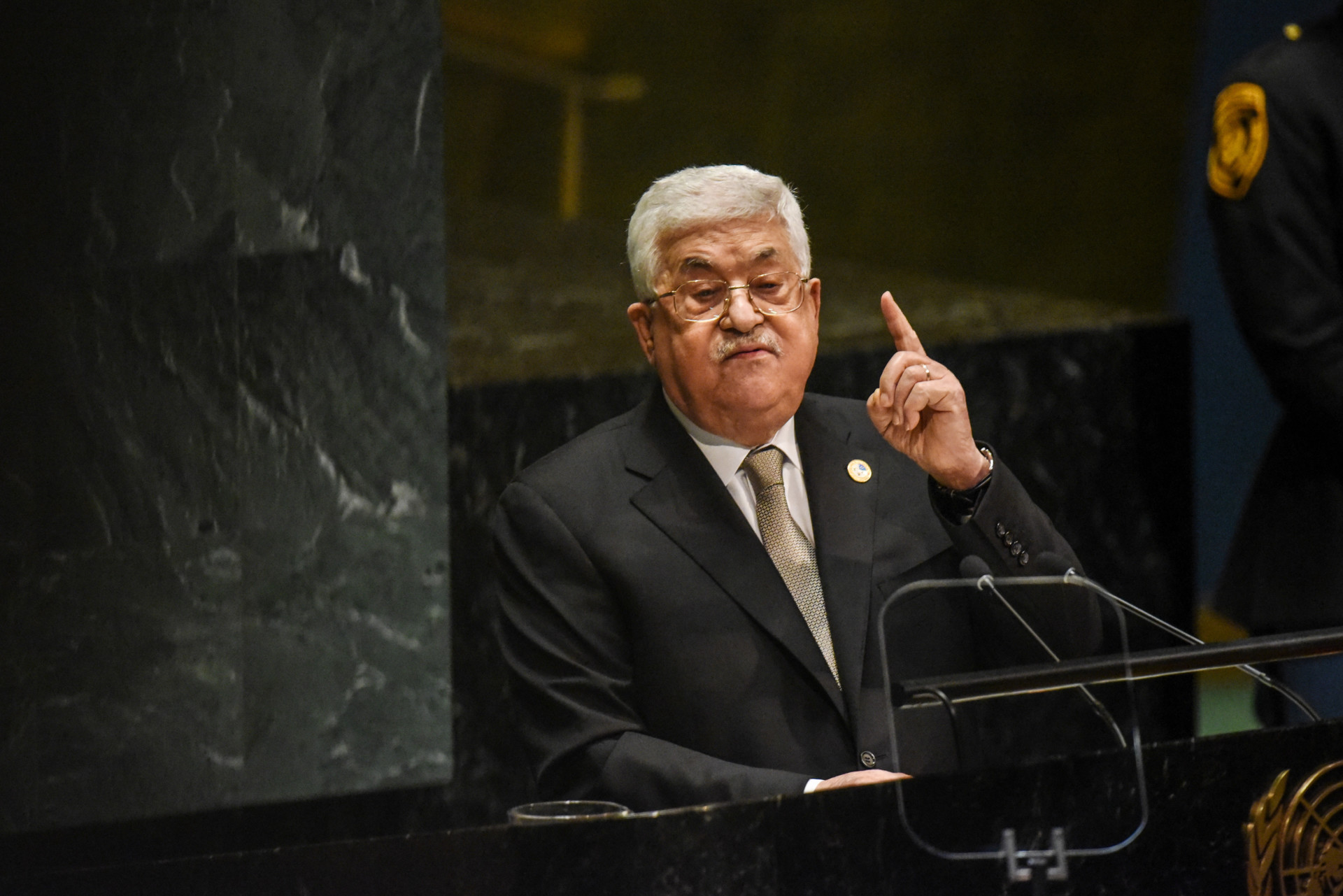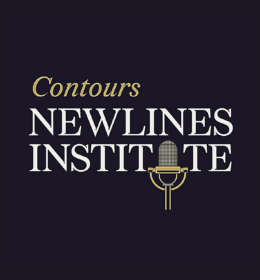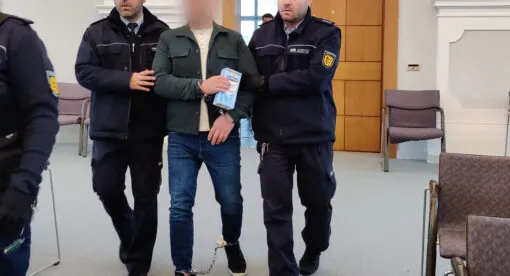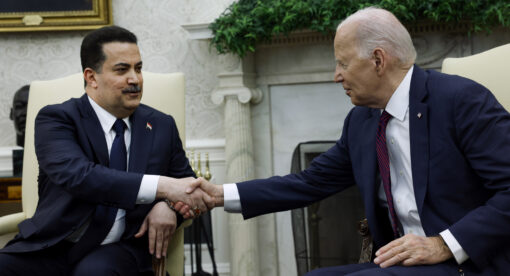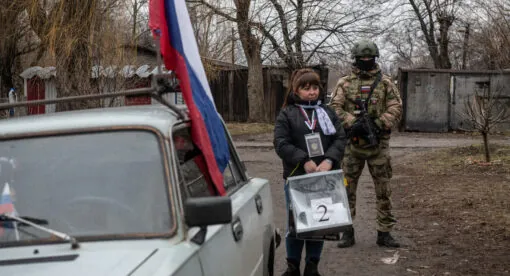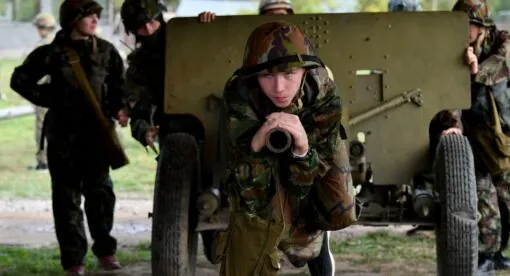The fourth major conflict centered in Gaza between Hamas and Israel since 2008 came to a fragile conclusion on May 21 with yet another precarious cease-fire agreement. The latest crisis has refocused international attention on the Israeli-Palestinian conflict, with fresh calls to address the underlying political issues that have led to repeated outbreaks of large-scale violence. Negotiations between the Palestine Liberation Organization (PLO) and Israel have been stalled for years, and the Palestinian National Authority — the administrative body in the occupied territories — is in an advanced state of decay in great part because of longstanding divisions within the Palestinian political landscape.
The outbreak of Gaza-centered violence overshadowed the war’s trigger: grassroots protests in Jerusalem during the month of Ramadan that spread throughout Israel and the occupied territories and escalated into raids by Israeli forces at the Al-Aqsa Mosque compound. What seems to have been completely eclipsed by the fighting is the fact that a mere 11 days before the latest round of armed conflict began, PNA President Mahmoud Abbas canceled the May 22 elections to the shuttered Palestinian Legislative Council (PLC) and the presidential election scheduled for two months later. Had they been held, the elections would have been a major step toward bringing an end to the intra-Palestinian division between Hamas and Fatah that began in 2007 – barely 18 months after the last parliamentary polls were held.
The development of two distinct Palestinian political entities separated by geography, factionalism, and ideology has been in place for 14 years. By canceling elections once again, the fragmentation, dysfunction, and crisis of legitimacy in Palestinian politics is prolonged, the disconnect between political elites and the public widens, and the risk of institutional collapse rises. As such, Washington’s long-term interest in a negotiated end to the Israeli-Palestinian conflict is not served, even if its long-time partner in the process — Abbas and his Fatah party — are weakened in the process.

Notably, Abbas made the decision to cancel the elections undemocratically at a meeting of political factions in Ramallah that did not include most party lists contesting the election. It also did not include Hamas, the Islamist movement that rules over the Gaza Strip and the primary rival of Fatah, which had agreed with the PNA to host the elections after numerous cancelations have kept the public from the polls for the previous 12 years.
Ostensibly, the decision to cancel was made because Israel had not certified whether it would allow Palestinian residents of Jerusalem to cast their ballots at local polling stations or vote absentee through the city’s postal service, as residents had done during previous election cycles in 1996 and 2006. The more plausible reason, however, is that in the run-up to the election Abbas had lost control over his own Fatah party and feared the likely outcome of heading to the polls in disarray.
Raising the stakes even further, the Biden administration had been signaling to the PNA its unease over the proposed elections. The U.S. State Department has designated Hamas a foreign terrorist organization since 1997 and clearly was anxious that its entrance into the fold of the PNA through elections would undermine the White House’s agenda of reestablishing ties with Palestinian institutions that had been severed under the Trump administration. Given that Abbas placed significant importance on winning Biden over, the octogenarian leader was likely emboldened by apprehensions from Washington to jettison the elections altogether – something he was already ready to do in the light of the political risks to himself and his Fatah party.
While pulling the plug mitigates some of the immediate threats to Abbas’ continued rule and relieves concerns shared by some international actors regarding Hamas, it further discredits the president and the PA in the eyes of the Palestinian public while derailing a rare opportunity to reinvigorate the Palestinians’ stagnant political system, reconstitute dormant institutions, and restore unity to a governing body that has been divided since the outcome of the last held election in 2006 led to a fight between Fatah and Hamas that ruptured the polity altogether.
As a result, the U.S.-backed Palestinian leader lacks a popular mandate and appears incapable of staying in office except through monopolizing power, blocking political competition, and repressing dissent. Moreover, by helping to prop up the PNA while discouraging its democratic renewal, the U.S. is promoting future instability, as there are no institutional processes in place without a functioning PLC to prevent the PNA’s collapse if Abbas, 85, suddenly passes. The Palestinians are also forced into a dilemma in which avoiding elections prolongs their political division but holding them risks rupturing relations with key external parties like the U.S.
Finally, any possibility that PNA elections could be used to kickstart a broader revival of the Palestinian national movement and overhaul of its institutions have been dashed. The resulting continuation of political paralysis leaves Palestinians unable to maneuver at a critical moment in which Israel’s right-wing government is advancing inexorably toward consolidating permanent control over the West Bank. This would preclude any chance of a negotiated resolution of the conflict, narrow options for all stakeholders, and raise the likeliness of an existential confrontation in the future.
Heightened Expectations
PNA elections were never going to be a cure-all for the myriad problems facing Palestinian politics. But over the past four months, the public had exhibited a level of political activity not seen in at least a decade. Energized by the prospect of participating in the first national electoral contest since 2006, Palestinians appeared to be shrugging off a malaise that has settled over their society under the compounded weight of their own repressive authoritarian leadership and Israel’s endless military occupation.
While there was good reason to be incredulous of their leaders’ intentions to follow through with elections, there was also cause to believe this time was different. During the past four years, Palestinian society had come under immense pressure from the Trump administration, which synchronized American policy with the Israeli far right’s goal of territorial expansionism; cut all aid to the Palestinians; and, with the Abraham Accords, fostered breakthroughs in the regional realignment between Israel and Arab Gulf states that undercut Arab support for the Palestinian issue, alarming both Fatah and Hamas.
The election of President Joe Biden buoyed Fatah in particular, which assumed that restoring democratic legitimacy and unifying the polity were prerequisites for full reengagement with Washington and possibly even a return to U.S.-sponsored peace negotiations. Fatah leaders and Hamas moderates agreed to move forward with elections while putting aside the need to first reconcile within the PNA — which previously had been considered a prerequisite.
Instead, officials met in Cairo on multiple occasions to hammer out ground rules for elections. These included guarantees on scheduling, a decision to allow local police in the West Bank and Gaza to guard polling sites, allowing freedom of expression during the campaigns, and the establishment and composition of a special court to resolve any disputes pertaining to the elections. As a result, the Palestinian public gave more credence to the process. By mid-March, 61 percent believed the elections would take place, compared to 32 percent three months prior.
But not all steps taken by Fatah and Hamas were promising. Significant hurdles were put in place to deter new, independent parties and younger candidates from running and winning. These included, among other prerequisites, one of the highest age requirements on candidates in the world at 28; a bank bond of $20,000 deposited with the Central Elections Commission; and a requirement that any public-sector employee or employee of a civil society organization that takes public funds resign from their job before running. Moreover, citizens were given only two months to produce a slate of 16 candidates and 3,000 signatures, and they would have had a mere 21 days before the election to legally campaign for votes — a tall ask for a public that had been prevented from political organizing for years by increasingly authoritarian governments in the West Bank and Gaza.
By the March 31 deadline, however, 29 new independent party lists had been formed. Nearly 1,400 candidates were set to vie for only 132 parliamentary seats. Around 93 percent of the electorate was registered to vote — a mix of previous registrants and nearly 1 million new voters, many of whom had come of age during the electoral lapse. Roughly 63 percent of those potential voters were under the age of 40, representative of an extremely young population in which 60 percent is under the age of 25.
The Jerusalem Pretext
In the run-up to the postponement, Israeli officials had not been vocal on the Palestinian elections — likely because they were consumed with their own political dysfunction — but the state security services were busy interfering in the democratic process by arresting and intimidating candidates. In Jerusalem in particular, Israeli police disrupted two election-related events and arrested organizers. The state appears to consider Palestinian expressions of national self-determination, such as elections, as an encroachment on its claims to exclusive sovereignty over the city.
Denying Palestinian residents of Jerusalem, the ability to organize and vote offered the PNA leadership an excuse to abandon what they had started. The fate of Jerusalem is a highly charged, emotional concern for Palestinians, who are increasingly cut off from what they regard as the center of their spiritual, political, and economic life. Sensitivity around Jerusalem was heightened even further after Trump chose to lend American recognition to Israel’s exclusive claim over the city in 2017.
Since then, the demolition of Palestinian homes, evictions of families, and illegal settlement building in Jerusalem have all risen to record levels. By late April of this year, the city had again become a flashpoint as Israel clamped down on Ramadan activities and “bands of right-wing Jewish extremists” marched through Jerusalem’s streets, attacking vulnerable Palestinian residents and chanting “death to Arabs” and “burn their villages” — images evoked by Abbas in his postponement speech.

It is not surprising, then, that Palestinians would view the exercise of their rights in the city as sacrosanct and be susceptible to the argument that holding elections without Jerusalem would be tantamount to abandoning their claims. Nonetheless, as elections neared and looked increasingly probable, the majority of Palestinians — 65 percent — were against canceling them on the basis of Jerusalem, according to the March polls, including most Jerusalemites.
In the days since the postponement, there has been a popular outcry and mobilizing of opposition to Abbas’ monopoly over the political system (he is PNA president, head of Fatah, chairman of the PLO, and president of the non-sovereign State of Palestine). On May 3, for example, 22 party lists announced they had formed a “coordinating council” to agree on steps to pressure Abbas.
Most voices have raised the glaring flaw of the Jerusalem pretext: Halting elections because of Israel’s actions regarding Jerusalem essentially hands Israel veto power over the functioning of internal Palestinian politics, and it eschews the option to resist Israeli restrictions on Palestinian rights. Indeed, in the two weeks ahead of the cancelation, Palestinian youths in Jerusalem were protesting nightly in large numbers against a municipal decision to prevent them from congregating during Ramadan at the Damascus Gate entrance to the Old City, one of the few open spaces available to them, and to evict families from their homes in Sheikh Jarrah. Facing a brutal police crackdown, Jerusalemites demonstrated their willingness to challenge Israeli policy — a counterpoint to Abbas’ reasoning that he willfully ignored.
Through this lens, it becomes harder to ignore Jerusalem being used as political cover to prevent a calamitous outcome for a ruling party that is coming undone.

Fatah’s Unraveling
The most significant result of the pre-election period was the unexpected fracturing of the PNA’s ruling Fatah party. In Abbas’ hands, the secular-nationalist movement co-founded and led for decades by Yasser Arafat has been transformed from a large and inclusive organization into an instrument of one-man rule in which Abbas and an insular circle of advisers make decisions without broader consultation. This style of leadership has given Abbas a tighter grip over Fatah and political decision-making writ large, but it has also marginalized once-relevant leaders and further stifled the rise of younger members — long a source of discord in its ranks. While Abbas’ total control of the PNA’s security agencies and purse strings has allowed him to skillfully keep a lid on disgruntled Fatah members, the prospect of elections provided a rare opportunity for the disaffected to challenge his rule.
That process began — predictably — with Muhammad Dahlan, the exiled Fatah leader and nemesis of Abbas. From his perch in Abu Dhabi, where he is a key adviser and political operator for Crown Prince Muhammad bin Zayed, Dahlan has gradually built the infrastructure and support, especially in Gaza, to create an opposition camp within Fatah.
A more recent and surprising defector was the Fatah stalwart Nasser al-Qudwa, a former PLO envoy to the United Nations and nephew of the late Arafat. After al-Qudwa suggested that he might run his own list in the election, Abbas booted him from Fatah’s Central Committee, then had him dismissed from his day job as head of the Yasser Arafat Foundation. The strong-arm tactic did not deter al-Qudwa, who, recognizing his own lack of support, sought out a far more popular figure in Palestinian politics to endorse his rival list: Marwan Barghouti.
Barghouti, a Fatah leader who rose to prominence as a young activist in the 1980s, has also been a political prisoner since 2002. From prison in Israel, Barghouti consistently polls well ahead of Abbas — or anyone — in public opinion surveys and intended to challenge the incumbent if an election was held on July 31. The emergence of Barghouti as prime challenger is reminiscent of the 2006 election, when he broke away from Fatah to form the rival Al-Mustaqbal electoral list composed of leaders from Fatah’s “Young Guard,” which included Dahlan. At the time, Abbas was able to convince Barghouti to abandon the move in order to avoid splitting the vote (which failed anyway), but nothing was ultimately done to address the frustration with Fatah’s sclerotic hierarchy and the generational rivalry at its core.
The political marriage between Barghouti and al-Qudwa, sealed with the creation of the “Freedom” list and the placement of Barghouti’s wife as its number two, had the potential to upset the balance among factions. If Freedom and Dahlan’s “Future” lists were to take enough votes away from the mainline of the party, the coalition possibilities that could have excluded Fatah would have grown, and given Abbas’ vulnerability in the presidential race, these elections may have dramatically reordered the political landscape — although there is no telling what it would have meant for Palestinian politics if Barghouti, still imprisoned, would have become president of the PNA.
Since canceling, Abbas has called for a unity government to be formed as a placeholder for an electoral contest, an idea other parties have rejected as unsatisfactory. Notably, Abbas has not consulted the breakaway Fatah factions for this exercise, which may only deepen the divisions within the ruling party.
Beyond the breakaways from Fatah, there were tens of other lists that could have sapped Fatah and Hamas of their support and provided a means of breaking their duopoly over Palestinian politics. These included parties aimed at representing the younger, politically alienated majority of voters. Notable, too, is the Generation for Democratic Renewal (JAD), an initiative spearheaded by a group of young Palestinians galvanized by the election excitement but wary of their ability to compete fairly. They decided to create a parallel electoral process online unhindered by the restrictive electoral laws put in place by Abbas in which they could run a virtual parliamentary list — although not actually competing for seats in the PLC. The idea is to build their organizational infrastructure, outreach capabilities, and political program and elect a slate of candidates through online primaries. They have an eye toward contesting future elections and eventually opening participation to Palestinians beyond the occupied territories in order to create a mechanism for representation for the broader national movement. Despite the cancelation of official elections, JAD plans to move forward with its virtual contest on May 22.

The Hamas Factor
Before elections were postponed, Hamas had lived up to its reputation as the most organized and disciplined Palestinian political actor. Unlike Fatah, it had proffered a single party list made up of popular local candidates and held a sequestered primary for party leadership that prevented the type of infighting experienced by its rival. As such, the political landscape was not entirely different than that preceding the 2006 election, which was highly advantageous for Hamas.
Nonetheless, three things stood in the way of the Islamist movement repeating its past triumph. First, Hamas’ popularity has dipped in the intervening years, as its governing performance has been tainted by repression, incompetence, and graft, as well as the inability to reverse the extreme hardship faced by Gazans as a result of Israel’s longstanding siege of the beleaguered territory. Second, the system of proportional representation in party lists adopted by the PNA would have provided a relatively hard cap on Hamas’ electoral gains in line with its public support, which stands around 20-30 percent of the electorate. As a result, winning a majority of seats in the PLC, as it did in 2006, would have been nearly impossible.
Third, Hamas could no longer ignore the prospect of a collision course with the U.S., Europe, and Israel that might ensue from its takeover of the PNA. For years, the organization had been apparently moderating its position on issues of concern to the PNA’s partners, including its stance on the two-state solution. Hamas’ leadership also appeared ready to limit the group’s role in government to a substantial but not dominant portion of the parliament and not seek the presidency. It could thereby gain political cover from the international legitimacy of the PNA without sparking a backlash against it.
If elections had taken place, Hamas would have also automatically gained representation in the PLO for the first time, in accordance with a new rule that gives all 132 PLC members seats in the Palestinian National Council (PNC) — the PLO’s parliamentary body. This would be no minor development. Hamas’ goal had once been to supplant the PLO as the legitimate representative of Palestinian people. In recent years, it has discussed joining the organization but wanted to renegotiate the PLO charter in line with its own. With the new rule, Hamas’ entry into the most important institution in the Palestinian national movement would have been a matter of procedure, with implications that are hard to quantify.
Hamas’ vocal opposition to the elections’ cancelation is to the group’s benefit: It does not have to share power in Gaza and can thus skirt the blame for the decision, damage Fatah’s reputation, and assert itself as being on the side of the voters. Hamas’ actual views on the election are a matter of debate, and the organization contains factions with differing views. The movement stood to gain and lose from elections in different ways, giving up exclusive control of Gaza but attaining international legitimacy and political cover inside the PNA and PLO.
In the U.S., New Administration and Old Policies
The Biden administration came into office with a limited set of policy goals on the Israeli-Palestinian conflict, which can roughly be characterized by a desire to reverse some Trump-era decisions, reengage with Palestinian political institutions, restart aid to sectors of Palestinian society not restricted by U.S. legislation, and recenter the two-state solution as America’s desired political outcome. But the administration is not interested in a serious investment of political capital on this issue or in expending much bandwidth on it. The administration has set its foreign policy priorities elsewhere, such as great-power competition with China, climate change, and the Iran nuclear agreement. Through personnel overlap with the Obama administration, the Biden White House is keenly aware of the domestic political costs of a major peace initiative or policy overhaul.
While the administration kept relatively quiet regarding the election, there was little question that it was anxious to avoid the headache that would likely accompany it. Hamas’ inclusion in the PNA and PLO were bound to trigger a backlash on U.S. engagement, legally and politically, that would complicate the administration’s policy agenda. And yet, the goal of two states negotiated by a legitimate Palestinian partner is likely impossible without Hamas’ participation or endorsement. It is simply too consequential an actor within the Palestinian polity to be sidelined.
In April, an unnamed senior U.S. official told a Palestinian newspaper that the elections were an internal Palestinian matter but that any Palestinian government must recognize Israel, accept past agreements, and commit to nonviolence (the Quartet Principles) for the U.S. to engage with it. A week later, another unnamed U.S. official, or perhaps the same, told a different Palestinian newspaper that Washington would “understand” if there was a postponement of the legislative elections.
Such equivocation by the U.S. was likely instrumental in Abbas’ decision to postpone. As a result of U.S. policy inconsistencies, the Palestinians are faced with a dilemma: Either avoid elections, in which case the polity remains divided and dysfunctional, or hold elections and unify the polity at great cost to external relations. In either case, stated U.S. interests are not served. A fractured Palestinian polity is unable to make strides toward the desired end goal of two states, and a united polity is incapable of engaging with the U.S. at all.
The U.S. unwillingness to invest political capital and capacity on the Israeli-Palestinian issue has meant that this administration does not have the will or resources to rethink its approach to Hamas, to Palestinian institutions, or to the current state and future trajectory of the Israeli-Palestinian conflict. Instead, it has adopted a set of anachronistic policies, disconnected from the reality on the ground, including a set of demands for Palestinians that were devised by the Bush administration in the 2000s, when the peace process was still operable and the two-state solution was on the table for negotiation. Today, absent those things, Palestinians are being forced to commit to a failed diplomatic framework and ushered down a dead-end road.
Not revisiting its approach to Palestinian politics may be convenient to the U.S. in the short term, but the longer-term implications could be disastrous as policy options narrow while the situation moves in a direction that conflicts with American interests.
Democracy Under Occupation
In the larger context, it should be recognized that the Palestinians are attempting to create democratic institutions in the fundamentally hostile and undemocratic environment of military occupation. This raises the question: Is democracy even possible absent a sovereign state and under such conditions of dependency?
Equally important is the fact that these elections were focused on reviving democratic legitimacy for the PNA, an institution whose mandate is both provisional and bound up in the Oslo Accords, a framework that is essentially defunct. Today, there is no peace process, and the challenge facing Palestinians is not negotiating with Israel over final status issues in furtherance of establishing an independent state. Israel’s right-wing leadership jettisoned that approach long ago and is pursuing unilateral territorial expansion, which would preclude a Palestinian state from ever coming into being in any meaningful sense.
At the same time, the international community continues to fund the entire Oslo Accords framework, including the PNA, under the premise of supporting a two-state solution. Yet without a viable Palestinian state in the works, the international community is more likely funding the structures of an apartheid state — a separate Palestinian infrastructure under Israeli sovereignty — in which the PNA is playing the role of enforcer of a permanently disenfranchised population. Policymakers around the world, including the U.S., will have to come to terms with this reality sooner or later — the nature of their relationships to Israel and the Palestinian Territories depend on it.
Omar H. Rahman is a Visiting Fellow at the Brookings Doha Center, where he is writing a book on Palestinian fragmentation in the post-Oslo era. Rahman is a writer, analyst, and multimedia journalist specializing in Middle East politics and American foreign policy. His work has appeared in The Washington Post, Foreign Policy, Rolling Stone, The Guardian, Lawfare, PBS NewsHour, VICE, Quartz, The National, Al Jazeera English, and World Politics Review, among others. He Tweets at @omarrahman.
The views expressed in this article are those of the author and not an official policy or position of the Newlines Institute.

